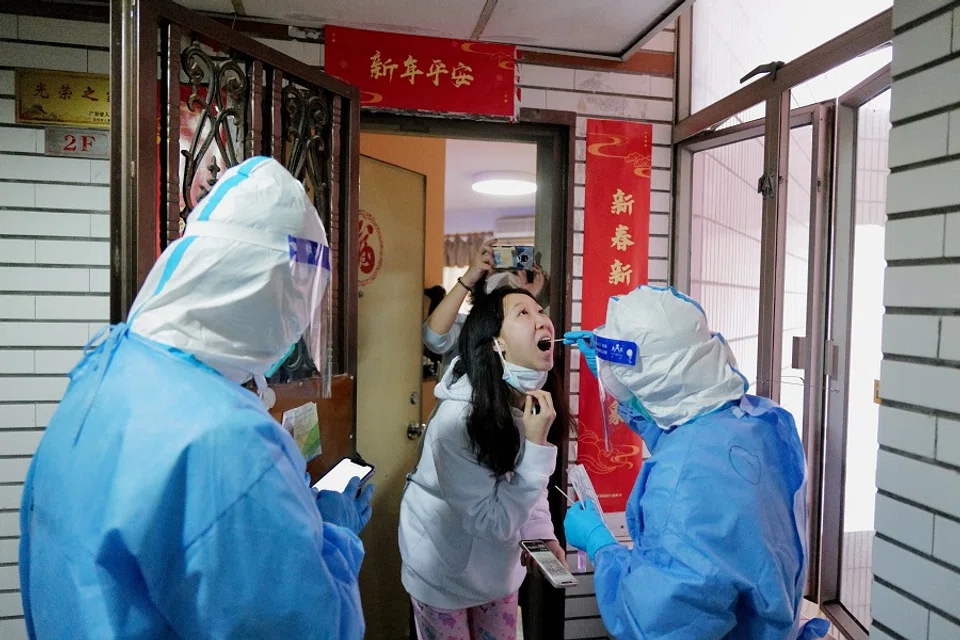Shenzhen's balancing act in fighting the pandemic
The dire pandemic situation in Hong Kong has trickled into Shenzhen through legal and illegal border crossings. However, the city has been trying its best to implement anti-epidemic measures without significantly impacting people's daily lives. Chinese commentator Chen Bing notes Shenzhen's transparency and openness in tackling the pandemic situation, and how its policy differs from the one-size-fits-all measures of some Chinese local governments.

After Covid-19 spread from Hong Kong to mainland China following cases of Hong Kongers illegally crossing the border to flee from the pandemic, some cities in the Guangdong-Hong Kong-Macau Greater Bay Area have been offering cash rewards in return for information on suspected illegal border crossings. However, Shenzhen has not done this or implemented other implicitly discriminatory measures. It has only bolstered its anti-epidemic measures.
Illegal border crossings a ticking time bomb
As Shenzhen is only separated from Hong Kong by a river, its pandemic control situation is particularly vulnerable. Travellers arriving from Hong Kong spread the virus to quarantine hotel employees, who in turn infected the community. Meanwhile, there were also illegal immigrants who took refuge with their relatives and friends in various parts of the mainland, thus causing outbreaks that needed the entire building or community to be lockdowned. Some Covid-positive container truck drivers also refused to obey anti-epidemic measures, and persisted in having their breakfast at street stalls.
Such behaviour has resulted in Shenzhen's worst Covid-19 outbreak since the pandemic started, with the four districts closest to Hong Kong, including Futian District and Luohu District, being most badly hit.

On 14 March, Shenzhen placed all residential communities under a week-long "closed management" and launched three rounds of citywide testing to overcome the outbreak. Shenzhen residents nonchalantly called these emergency measures a way of "slow living" to achieve "quick containment" so that life could go back to normal as soon as possible.
Shenzhen's pandemic strategy
Nonetheless, the people of Shenzhen do not blame Hong Kong and the authorities have not highlighted the fact that these cases "came from Hong Kong" either. Medical terms, rather than discriminatory ones, are professionally used in the daily reports, in accordance with the World Health Organization's standard format.
A peer of mine from Hong Kong commented, "The dignified ways of Shenzhen are perfectly exemplified in its pandemic containment efforts. This is probably related to its high degree of openness and rich experience of interacting with the world. They know that Omicron can infect anyone and anywhere."
It no longer conforms to some rigid model but instead considers both anti-epidemic measures and the people's lifestyle needs at the same time...
Shenzhen's dignified ways are also seen in its transparent and open Covid-19 situation reports. Following the worsening outbreak, Shenzhen now releases Covid-19 situation reports and answers media queries every morning at 10:30am.
The timely updates of the situation and anti-epidemic measures have assuaged residents' anxiety about the pandemic and encouraged everyone to readily cooperate with the measures, creating a conducive environment for pandemic containment. Some netizens remark that the residents of Shenzhen read two "battle reports" every day, one on the Russia-Ukraine war and the other on Shenzhen's battle with Covid-19.

Shenzhen's anti-epidemic strategy seems to be one of a kind as well. It no longer conforms to some rigid model but instead considers both anti-epidemic measures and the people's lifestyle needs at the same time, using the effectiveness of prevention and control as the criteria for assessment.
Aside from implementing a later start time for primary and secondary schools, Shenzhen has also introduced a multi-tiered control system as part of its anti-epidemic measures. Senior year students continue to attend school under closed-loop management so as to not disrupt their college entrance examination (gaokao); students in primary four and above will attend online lessons; and students in primary three and below will stay home for reading programmes, help with household chores or participate in other cultural and sports activities as designated by the school.
Following the closed management of all residential communities, subways and bus services have been suspended, but supermarkets and pharmacies remain open and residents are allowed to shop at nearby stores. In a way, the city is still functional and operational for everyday living.
And so, there are no simple, crude, one-size-fits-all measures, nor are there scenes of suspected cases being loaded onto huge buses and transported to quarantine centres.
A functioning economy
Combining big-picture pandemic efforts with the people's needs also shows the dignified side of Shenzhen. When there is a confirmed case in a building, Shenzhen locks down just that building and not the entire neighbourhood or community. The neighbourhood is treated as a "controlled area" (管控区), so that residents still have some freedom of movement within the community. When the community moves from "controlled" to the more relaxed "on guard" (防范区) level, while residents are still discouraged from leaving the community, business owners with special permits can continue to run their business in the area.
This special economic zone - which emulates Deng Xiaoping's theory of "black cat or white cat, if it can catch mice, it is a good cat" - is pragmatic and acknowledges that life has to go on despite the strict pandemic controls. And so, there are no simple, crude, one-size-fits-all measures, nor are there scenes of suspected cases being loaded onto huge buses and transported to quarantine centres. Whether you are treated in a hospital, quarantined at home or allowed to go to work, the nucleic acid test results are what counts. In the current control period, people can still commute between home and work, especially the essential workers.

Shenzhen's dignified ways in managing the pandemic also lie in turning cold pandemic efforts into a relatively warm and inspiring experience, with good coordination between the local government and its people.
If a pregnant woman has trouble checking into the hospital, the "call me" line on the official WeChat account could help resolve the issue. If the public queue for testing is too long, the agency in charge quickly sets up more testing locations. If those on home quarantine have difficulties with online purchases, there are merchants who will immediately fulfil and deliver the order. Foreigners in Shenzhen join the ranks of volunteers and like what they've proclaimed, "Foreigners are not outsiders!" A journalist learns that his residential community has been designated a controlled area and chooses to stay at a hotel instead of going home because he wants to continue reporting on frontline pandemic efforts.
What is the point of pessimism or complaining when the pandemic is already here? Might as well face it steadily and unite to work together.
In one incident, a man entered a community just to use the washroom, and during that time, the community was designated as a controlled area, so the man stepped forward to become a community volunteer. In another, employees had asked their boss to courier their laptops so that they could work from home. Also, as long as a food delivery staff tests negative, they can ply the streets and make deliveries over the next 24 hours, to bring home the bacon and provide a service to the people. Shenzhen residents are making a living for themselves but they also want to offer support to others in the community.
... they know that if the pandemic in Hong Kong gets out of control, then Shenzhen's defences will be breached, the Greater Bay Area will be lost, and the anti-epidemic efforts of the whole nation will be affected.
Lending a helping hand to Hong Kong
Shenzhen has also taken on the responsibility of helping Hong Kong fight the pandemic. Every day, it delivers large amounts of supplies and daily necessities to Hong Kong, and also sends medical personnel to help. The people of Shenzhen are not holding back - they know that if the pandemic in Hong Kong gets out of control, then Shenzhen's defences will be breached, the Greater Bay Area will be lost, and the anti-epidemic efforts of the whole nation will be affected.

A veteran journalist says that Shenzhen is looking at the big picture, as well as showing gratitude, in its all-out efforts to help Hong Kong's pandemic fight. Hong Kong and Shenzhen are brethren - now that Hong Kong is in trouble, of course Shenzhen will do all it can to help. He laughs and says, "Now that is Shenzhen showing its dignity!"



![[Photos] Fact versus fiction: The portrayal of WWII anti-Japanese martyrs in Taiwan](https://cassette.sphdigital.com.sg/image/thinkchina/3494f8bd481870f7c65b881fd21a3fd733f573f23232376e39c532a2c7593cbc)

